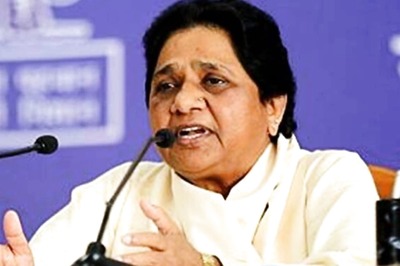
views
“I want to kill her,” he said. The 19-year-old law student was livid that his girlfriend broke away from him. “I want to take revenge,” he continued while talking to me a year ago. This boy was possessive and stifled the girl completely. Dr Richard Lettieri, a psychologist, has the following to say about such behaviours: “Emotions, including anger, continue to fester long after the provoking event. Intense emotions tend to increase over time until a behaviourally relieving discharge occurs. As anger develops, it creates an urgency to take action, disrupting judgement and rational decision making.”
Such possessiveness is also known as obsessive relational intrusion (ORI) which is defined as repeated and unwanted behaviours toward a partner that invade his/her privacy and cause fear for his/her safety. Obsessive passion and fear of abandonment can lead to violence against the partner.
The boy I mentioned above recovered as his healthy friends befriended him, gave him company and he was subsequently counselled.
Emotional blinding and emotional hijacking where reason fails and action explodes is a common feature among people caught in the throes of rapid pace, loneliness and social change where angst predominates. In my experience, “I will teach him or her a lesson” is a phrase one listens to among all age groups, more so in the last decade. In an era where ‘disconnection’ is a disease, there are very few avenues for the young to heal their anger or find a route for it to be resolved. The pressure cooker minds among many can explode with disastrous consequences to self or others.
In this context, the death of a young girl at the hands of her alleged boyfriend and the demise of the boy himself via self-harm at a university in Noida a few days ago has sent shock waves across the country. Though many describe it as an aberration, there has been an increase in violence against women in recent times. Violence by intimate partners is the highest in Asian countries. The rate of crime against women rose by 15 percent in one year, from 56.5 percent in 2020 to 64.5 percent in 2021. The cases of crimes against women in Delhi accounted for 32.20 percent of total crimes in the category among all 19 metropolitan cities. Delhi also recorded 13,892 cases of crimes against women in 2021, a significant surge of more than 40 percent compared to 2020 when the figure was 9,782 (NCRB 2022). The reasons for such heinous crimes need to be researched and generic textbook answers may not help fathom the true picture on the ground. Colleges, students and families can work together to prevent a lot of violence.
Following can be a few preventive measures:
Breaking the conspiracy of silence
Years ago in a school where I was associated, four 15-year-olds drove a car illegally and met with an accident. Later, we realised that other kids knew about it and kept quiet out of loyalty and fear. Many students may express their desire to harm others or themselves with their peers when in distress. Lack of awareness of issues related to violence and self-harm is a severe impediment. This should never be brushed away and a mechanism of anonymous reporting and intervention should be in place in educational institutions. Conspiracy of silence that originates from loyalty to one’s own peers based on caste, region, religion or social class and fear also needs to be broken. At Shiv Nadar University, I am sure some students may have been aware of those who use drugs, carry weapons, and are violent or disturbed but they may have all kept quiet.
Sense of belonging
Breaking the silence requires a sense of belonging. Students should feel that they are part of one community where interdependence, collaboration and cooperative learning are significant factors for holistic growth. Colleges that teach business, law, engineering, design, medicine etc need to spend equal time and effort in building an ecosystem that promotes well-being and mental health. I have been conducting workshops on ‘love, life and learning’ for many years but this only can be a beginning. A systems approach where every student’s emotional and physical health is tracked is the need of the hour. A college where emotions such as anger, sadness, fear, joy, envy, love, shame and guilt are discussed openly is a healthy college. Mindfulness, Yoga and Vipassana have to be as important as business economics, international business, computer engineering and other subjects. These practices will help bring in synchrony between the mind and the body when faculties breathe down the neck of the students for assignments, deadlines and tests. In my experience, while travelling across India, I realise that the ability to understand emotional well-being among the majority of top-notch faculties is very poor. Their sensitisation should have the same impetus and intensity as for the students. When a single faculty is insensitive in a college, the entire batch of students may suffer. This may be due to a lack of awareness but a chronic refusal to be aware can be termed as arrogance. Yet, I would request my fraternity to keep chipping in till the irrational beliefs about emotional health crack. The humanistic philosophy of the college is very important not only in printed fancy brochures but in its actionable transaction.
Changing the Narratives
The other day I asked a bunch of management college teachers to name the four pillars of an educational institution. The common replies were: Teaching, Examinations, Results and Job Placements. Very few mentioned emotional well-being. In the movie Mohabattein, Amitabh Bachchan too proclaims that parampara (tradition), pratishtha (prestige) and anushasan (discipline) are the three pillars of his Gurukul. Educational institutions need to open their eyes and their ears to the ground with respect to mental health. Information about students who are very sad, depressed, harbouring suicidal/violent thoughts, have had break ups, having difficult family situations, financial stress, having bad grades or other stressors should reach the anointed faculties/mental health professionals as soon as possible. Heightened psychological vigilance is the need of the hour and teachers need to reach out to them before a catastrophe. False and exaggerated understanding of privacy issues should be discarded. In the event of impending violence or self-harm, privacy should be invaded to save lives. Families should also contribute to the information processing system related to the mental health of their wards. Knowledge of mental illness/violent predisposition should always be shared with the institution and an inclusive policy towards those who are under treatment should be followed by the colleges. Many colleges have appointed faculty members as mentors for students but they need to be trained to identify students at risk and intervene or seek help.
Screening and Intervention
Screening of students for mental health issues periodically should be given priority. Mental well-being centre is a must in every institution and should be visible. The faculties need to patronise it so that students find it easy to access help. Mental health counsellors should be seen visiting classrooms and hostels and conducting activities to promote mental health. Every student should be treated equally irrespective of their antecedents.
Red flags that need to be reported immediately to the college authorities by students are:
- Threat of violence or self-harm
- Constantly being stalked and abused
- Forced to share all private details or passwords
- Forced to share live locations all the time
- Blackmail with pictures or videos
- Any form of exploitation
- Acts that cause fear, a threat to life etc
- Forced to consume drugs or have physical intimacy
- Is being cheated on or is in touch with multiple partners
All colleges need to have a robust liaison with law-enforcing agencies and medical establishments. Students need to believe that they need a circle of safety of healthy friends where they can be emotionally vulnerable. The circumference of safety can help identify danger signs early and pre-empt the loss of lives.
Special Populations
Students who have low self-esteem/self-worth and depression tend to cling and get into exploitative relationships. Such students may be toppers in the college but a wide vacuum in their personality may not be visible to all. Those harbouring Cluster B personalities are more prone to violence and they exist in all populations. The four types of Cluster B personality disorders are- Borderline Personality, Histrionic Personality Disorder, Narcissistic Personality Disorder and Antisocial Personality Disorder. Such students can be emotionally unstable, have an excessive fear of abandonment, can be attention seeking, may have an inflated self-esteem, possess a sense of entitlement, lack empathy towards others, have no remorse or guilt and disregard the feelings of others. These symptoms may exist in dilute forms and different combinations in many students. Social checks may keep them tamed but in an era of anonymity and alienation, they may explode without inhibition following a mild provocation. These special populations need to be identified and subjected to rational conversations and if required, counselling.
Students, educational institutions and families chasing the moolah, pay packages, fancy cars and homes need to understand that connectedness, compassion and collaborative interdependence can only guarantee health and happiness, failing which, a large number of artistically manufactured fractured souls will be let loose on our beautiful Earth. It is time to focus on holistic development and well-being.
Dr Harish Shetty is a Psychiatrist and has been working with students across three decades and conducts sessions in educational institutions regularly. Views expressed are personal.



















Comments
0 comment